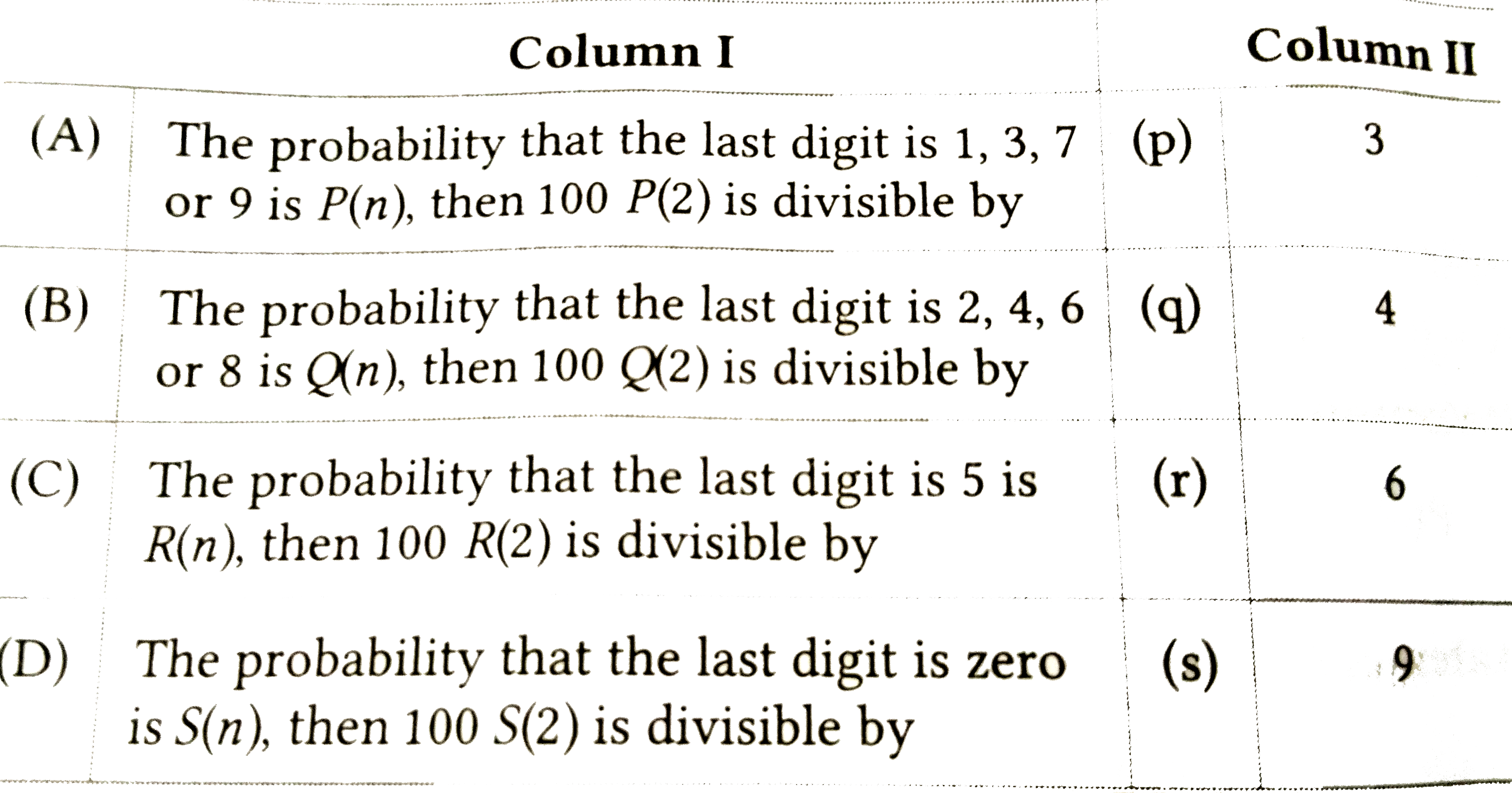If n positive integers are taken at random and multiplied together, then the probability that the last digit of the product is 2,4,6 or 8, is
8n5n
8n−2n5n
4n−2n5n
none of these
The correct Answer is:C
To solve the problem of finding the probability that the last digit of the product of n positive integers is 2, 4, 6, or 8, we can follow these steps:
Step 1: Understand the last digit of products
The last digit of a product depends on the last digits of the numbers being multiplied. The possible last digits of positive integers are 0, 1, 2, 3, 4, 5, 6, 7, 8, and 9.
Step 2: Identify favorable outcomes
We are interested in the last digits 2, 4, 6, and 8. These digits are even, which means we need to consider the last digits of the integers that contribute to these outcomes.
Step 3: Count the total possible last digits
The total last digits of positive integers from 1 to 10 are:
- 1, 2, 3, 4, 5, 6, 7, 8, 9, 0
Step 4: Identify the last digits that lead to even outcomes
The last digits that can lead to an even product (2, 4, 6, 8) are:
- 2, 4, 6, 8 (favorable outcomes)
- 0 (not favorable for our case since we want only 2, 4, 6, or 8)
Step 5: Calculate the probability of getting an even last digit
The even last digits from 0 to 9 are:
- 0, 2, 4, 6, 8
Thus, there are 5 even last digits. Out of these, 4 are favorable (2, 4, 6, 8).
Step 6: Calculate the probability
The probability P that the last digit of the product is 2, 4, 6, or 8 can be calculated as follows:
P=Number of favorable outcomesTotal outcomes=410=25
Step 7: Consider the number of integers n
Since we are taking n positive integers, the probability remains the same for each integer chosen. Therefore, the probability that the last digit of the product of n integers is 2, 4, 6, or 8 is:
P=(25)n
Final Result
Thus, the probability that the last digit of the product of n positive integers is 2, 4, 6, or 8 is:
25n
---
The last digit of a product depends on the last digits of the numbers being multiplied. The possible last digits of positive integers are 0, 1, 2, 3, 4, 5, 6, 7, 8, and 9.
We are interested in the last digits 2, 4, 6, and 8. These digits are even, which means we need to consider the last digits of the integers that contribute to these outcomes.
The total last digits of positive integers from 1 to 10 are:
- 1, 2, 3, 4, 5, 6, 7, 8, 9, 0
The last digits that can lead to an even product (2, 4, 6, 8) are:
- 2, 4, 6, 8 (favorable outcomes)
- 0 (not favorable for our case since we want only 2, 4, 6, or 8)
The even last digits from 0 to 9 are:
- 0, 2, 4, 6, 8
The probability P that the last digit of the product is 2, 4, 6, or 8 can be calculated as follows:
Since we are taking n positive integers, the probability remains the same for each integer chosen. Therefore, the probability that the last digit of the product of n integers is 2, 4, 6, or 8 is:
Thus, the probability that the last digit of the product of n positive integers is 2, 4, 6, or 8 is:
Topper's Solved these Questions
- PROBABILITY BOOK - OBJECTIVE RD SHARMA ENGLISHCHAPTER - PROBABILITY EXERCISE - Section II - Assertion Reason Type
22 Videos
- PROBABILITY BOOK - OBJECTIVE RD SHARMA ENGLISHCHAPTER - PROBABILITY EXERCISE - Chapter Test
45 Videos
- PROBABILITY BOOK - OBJECTIVE RD SHARMA ENGLISHCHAPTER - PROBABILITY EXERCISE - Section- II (Assertion -Reason Types MCQs)
15 Videos
- PERMUTATIONS AND COMBINATIONSBOOK - OBJECTIVE RD SHARMA ENGLISHCHAPTER - PERMUTATIONS AND COMBINATIONSEXERCISE - Chapter Test
60 Videos
- QUADRATIC EXPRESSIONS AND EQUATIONS BOOK - OBJECTIVE RD SHARMA ENGLISHCHAPTER - QUADRATIC EXPRESSIONS AND EQUATIONS EXERCISE - Chapter Test
50 Videos
Similar Questions
If 5 positive integers are taken at random and multiplied together. The probability that the last digit of the product is 2,4,6,8 is
View SolutionIf n positive integers taken at random are multiplied together.

View SolutionIf n integers taken at random are multiplied together , then the probability that the last digit of the product is 1, 3, 7, or 9 is a. 2n/5n b. 4n−2n/5n c. 4n/5n d. none of these
View SolutionIf four whole numbers taken at random are multiplied together, then find the probability that the last digit in the product is 1,3,7 or 9.
View SolutionIf four whole numbers taken art random are multiplied together, then find the probability that the last digit in the product is 1,3,7, or 9.
View SolutionFour positive integers are taken at random and are multiplied together. Then the probability that the product ends in an odd digit than 5 is
View SolutionAn integer is chosen at random and squared. Find the probability that the last digit of the square is 1 or 5.
View SolutionTwo integers are chosen at random and multiplied. Find the probability that the product is an even integer.
View SolutionTwo integers are chosen at random and multiplied. Find the probability that the product is an even integer.
View SolutionIf any four numbers are slected and they are multiplied, then the probability that the last digit will be 1,3,5or7 is
View Solution
